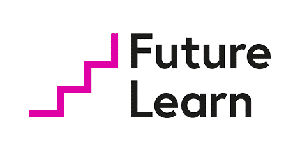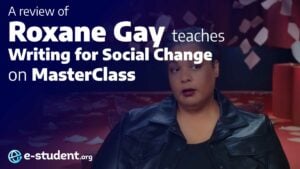FutureLearn, Britain’s finest online education provider, has managed to put British online courses on the world map. Besides online courses, FutureLearn also offers some of the best-in-class micro-credential programs, certificates, and online degrees. In this FutureLearn review, I will delve deeper into the MOOC platform to assess whether or not FutureLearn is legit and worth it in 2020.
Table of Contents
“By minimizing the loneliness of distance learning, FutureLearn cuts non-completion rates. Of those who begin taking our courses, 22% complete most of the steps and all assessments. That’s two to three times better than other MOOC providers.”
Simon Nelson, CEO of FutureLearn
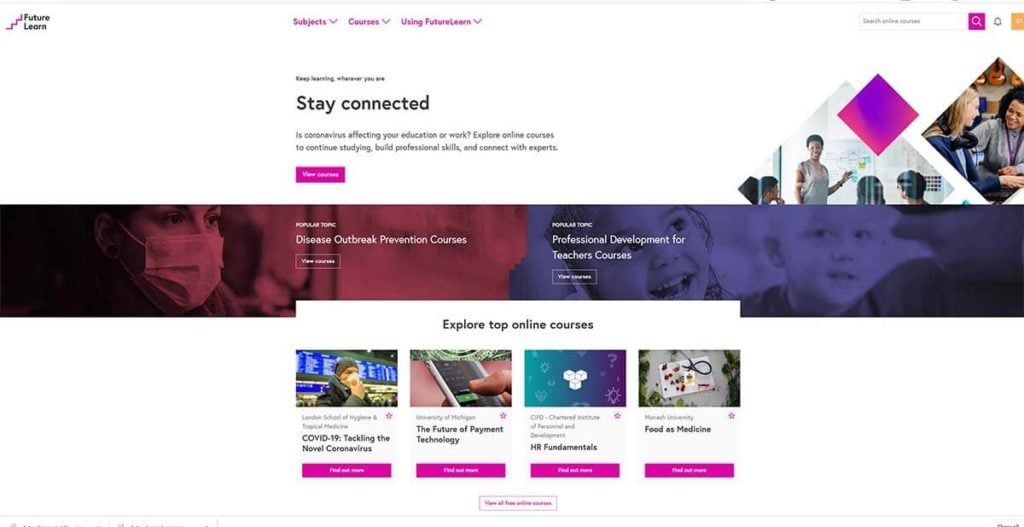
What is FutureLearn?
FutureLearn is a London-based online learning platform that offers fully-accredited online courses, micro-credential programs, and online degrees. Founded in 2012, FutureLearn was designed to make the United Kingdom more competitive amongst major edtech companies. FutureLearn now has over 175 global institutional partners and 10 million learners.
Is FutureLearn accredited?
Yes, FutureLearn courses are fully accredited and recognized for their authenticity, and FutureLearn certificates are issued by universities. Online courses offered on FutureLearn are from universities rather than individual instructors, and accreditation is done not only by FutureLearn but also by the institutions that developed the course.
Who owns FutureLearn?
FutureLearn is currently co-owned by the Open University and the Seek Group, both of whom have a 50% percent stake in the company. Until 2019, FutureLearn was wholly owned by the Open University, UK’s largest undergraduate university.
How is FutureLearn funded?
FutureLearn’s largest source of funding so far has been the Seek Groups’ £50 million investment in April of 2019, through which Seek gained a 50% stake in the company. FutureLearn’s initial funding, though, was from the Open University and the other 12 UK-based founding universities of FutureLearn.
How does FutureLearn make money?
FutureLearn primarily makes money through tuition fees for their online courses, micro-credential programs, and online degrees. Additionally, FutureLearn earns money from yearly subscriptions to FutureLearn Unlimited, FutureLearn for Business customers, paid end-of-course assessments and certificates. Additional revenue is generated through the FutureLearn shop which sells CDs and accessories.
How Does FutureLearn Work?
FutureLearn works by offering courses, micro-credentials and online degrees to students. When the program starts, students are given access to weekly units with various types of learning materials such as quizzes, videos, and assignments. Paying students who finish the program are sent certificates in digital or physical form.
How to use FutureLearn?
Using FutureLearn involves the following steps:
- Pick an online class
- Choose a payment plan (Free, Upgrade, or Unlimited)
- Enroll in the class of your choice
- Start the course
- Learn through reading, writing, communicating, watching, and listening
- Complete the course
- Receive a digital or physical certificate
How Much Does FutureLearn Cost?
Most of FutureLearn’s courses can be audited for free. Auditing, however, does not include certificates, which cost around $39 to $99 extra. Premium FutureLearn courses cannot be audited for free and cost around $100 to $400. Micro-credential programs and online degrees are the most expensive, starting at $600.
When taking a course on FutureLearn, students are given the choice between three payment options:
- Free: Nonpaying students who use the “Free” plan get full access to the course materials, but they cannot become certified.
- Upgrade: The “Upgrade” plan allows you to receive a fully recognized certificate when you complete the course. It also gives you access to course tests if there are any.
- Unlimited: The “Unlimited” plan is a yearly subscription that gives you unlimited access to all of FutureLearn’s short courses and tests. It also includes all the advantages of the “Upgrade” plan.
Is FutureLearn free?
FutureLearn can be used for free and students can freely access all the course materials for the course duration plus 14 days. This includes videos, reading materials, and discussion forums. However, premium courses, micro-credential programs, and online degrees are exempt from this and require paying.
FutureLearn’s subscription plan (Unlimited)
FutureLearn’s yearly subscription plan, Unlimited, costs $269.99 per year and it’s an excellent alternative to the “Upgrade” plan if you find yourself taking FutureLearn’s courses regularly. Not only does it give you unlimited access to a wide range of courses, but it also gives you certificates for any courses you complete.
The price of $269.99 per year seems rather high at first glance. However, when compared to Coursera Plus, an identical subscription-based service, it appears rather cheap. That is because Coursera Plus costs $399 per year – a 47% increase in price when compared to FutureLearn. It’s difficult to compare the two prices directly, though, because Coursera’s catalog of online courses is unquestionably superior. After all, Coursera has close to ten times more online courses than FutureLearn.
In the end, though, neither of them is cheap, and paying for a yearly subscription on either of the two platforms only really makes financial sense if you’re a very active student. Taking 1-2 courses per year is not enough to justify the yearly cost. However, if you find yourself taking new online courses on FutureLearn each month, then Unlimited already starts to become a very appealing choice.
FutureLearn Online Courses
Overall, online courses on FutureLearn are similar to other popular MOOC providers. As usual, they mostly consist of reading materials and video clips, with tests and assignments usually placed at the end of weekly units. The course syllabuses are very easy to navigate, and the overall user experience of FutureLearn’s courses is some of the best I’ve seen. However, when compared to other MOOC providers, the small course catalog could be one of FutureLearn’s biggest drawbacks at the current point in time. Let’s have a closer look at what they have to offer.
Selection of online courses
As of the writing of this review, there are a total of 437 online courses available on FutureLearn. While there are courses from virtually all education subjects, the biggest emphasis on FutureLearn appears to be on the following course subjects:
- Business & Management – 110 courses
- Healthcare & Medicine – 105 courses
- Science, Engineering & Math – 71 courses
- Teaching – 69 courses
Business is the most popular subject for the majority of online students across all platforms, with 17% of all online undergraduate students studying business. Therefore, it doesn’t come as a surprise to see it as the most offered subject on FutureLearn.
However, seeing healthcare and teaching amongst the most-taught subjects of a MOOC platform is a truly refreshing sight. Seeing this, I think it’s safe to say that FutureLearn is targeting a new audience of learners when compared to other MOOC sites. With fantastic courses in genomics, healthy lifestyles, dementia, and nursing, FutureLearn is also set to train a new generation of healthcare professionals.
This makes FutureLearn an ideal platform for such professionals who have trouble finding relevant online courses elsewhere. FutureLearn’s unique offering of course subjects will likely have something for these learners who would otherwise feel left out.
Are FutureLearn courses any good?
Yes, FutureLearn’s courses are superb. Taking an online course on FutureLearn is a wholly positive experience, due to the overwhelmingly supportive community of co-learners, attentive instructors, and well-built curricula. Students on FutureLearn actively comment on forums, ask questions from one another, and the sense of community is excellent.
Are FutureLearn’s Courses Free?
Most of FutureLearn’s online courses can be taken for free, except for premium courses, micro-credential programs, and online degrees. However, nonpaying students only have access to the course for the entire course duration plus 14 days extra. Also, FutureLearn’s free courses don’t include course tests or certificates.
If you search around a bit, as it is not well publicized, you’ll also find that FutureLearn maintains a list of courses that are completely free to complete – most of them part of partnerships or sponsorships that allow them to offer them to students free of charge.
FutureLearn Micro-credentials & Accreditation Programs
If you’re unfamiliar with micro-credential programs, I will get you up to date. Micro-credential programs are online certification programs that verify a graduate’s competence in a specific field. Micro-credentials are fully accredited and require at least 100 hours of study. These programs are best suited for students and working professionals who want to bolster their resumes and progress on their chosen career path.
FutureLearn’s micro-credential programs are special in that they are one of the first to abide by the standards set by Europe’s new Common Microcredential Framework. The framework was created to standardize micro-credential programs and to ensure that micro-credential courses are built to high-quality standards. This would ensure better consistency, quality, and portability across MOOC platforms.
Besides FutureLearn, some of the founding partners of the Common Microcredential Framework include FUN, OpenupEd, and Miriadax. I’m very interested to see whether U.S.-based e-learning providers will also start to comply with the framework’s standards. As of right now, FutureLearn is one of the very few MOOC platforms to abide by these standards.
Why take a micro-credential program?
Taking a micro-credential program on FutureLearn brings a number of benefits when compared to a regular short course:
- Highly valuable certificates. As micro-credentials are time-intensive and comprehensive, they also result in certificates that truly prove a graduate’s competence. Many employers don’t trust regular online course certificates, while the majority trust micro-credential certificates.
- University credit. Micro-credential programs on FutureLearn provide credit towards a full-sized Master’s degree.
- Project-based assessments. Micro-credential programs allow for a considerable amount of one-on-one interaction with the instructors. This makes student projects especially valuable, as they are created through highly personalized student-instructor cooperation and mentorship.
Selection of micro-credentials
FutureLearn currently has 8 micro-credential programs available. Here is a list of the currently available micro-credential programs and their cost:
- “Cyber Security Operations” by The Open University: $829 (endorsed by Cisco Networking Academy)
- “Data Science: Data-Driven Decision Making” by Monash University: $1024
- “Digital Photography: Creating a Professional Portfolio” by The Open University: $624 (endorsed by the Royal Photographic Society)
- “FinTech – Financial Innovation” by Dublin City University: $1659
- “Project Management: Managing Front-End Planning” by the Queensland University of Technology: $1369
- “Research Methods” by Deakin University: $1024
- “Sports Coaching” by Deakin University: $1194
- “Teacher Training: Embedding Mental Health in the Curriculum” by The Open University: $624 (endorsed by Mental Health Foundation)
Other accreditation programs
In addition to the micro-credential programs mentioned in the previous chapter, FutureLearn also offers alternative forms of academic and professional certification:
- 9 Programs with academic accreditation. These courses are designed to help students pursue academic degrees. They take between 10 and 54 weeks to complete and result in a recognized academic credential upon graduation.
- 5 Programs with professional accreditation. These courses are designed for professional development and career progression. They take between 14 and 20 weeks to complete and result in a professional certificate upon graduation.
If you’d like to see the details of these accreditation programs, refer to the “programs” section of FutureLearn.
FutureLearn Certificate Review
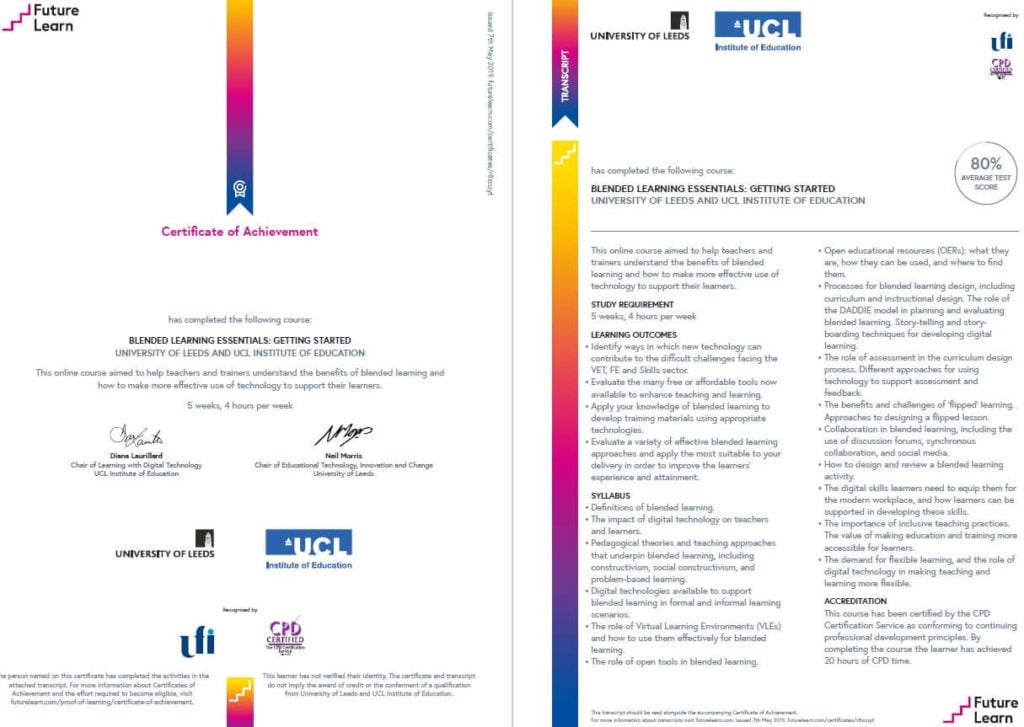
FutureLearn currently offers the following types of accredited certificates:
- Course certificates. These certificates are offered by universities for completing one of FutureLearn’s 430+ online courses. They typically take 2 to 8 weeks to complete and cost between $39 and $99.
- Micro-credential program certificates. Micro-credential program certificates are a step above short course certificates. They take between 10 to 13 weeks to complete and cost between $600 and $1600.
- Postgraduate certificates. These certificates require degree-level knowledge and a considerable amount of studying. They take between 6 to 9 months to complete and cost between $3500 and $7000.
Does FutureLearn give free certificates?
Yes. FutureLearn offers free certificates for a limited amount of accredited online courses. Through these courses, qualifying students can get certificates at no cost. All free FutureLearn certification courses can be found here. As of the writing of this review, there are 28 free certification courses available.
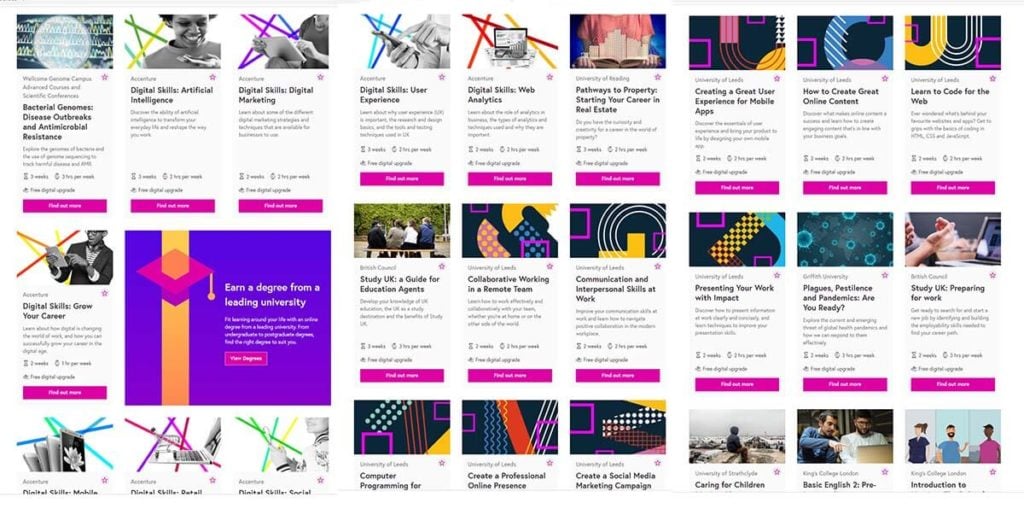
Are FutureLearn certificates recognized?
Yes, all of FutureLearn’s certificates are accredited and recognized by well-known organizations. However, not all FutureLearn certificates are equal in terms of recognition. Some certificates are seen as more trustworthy than others. Short course certificates, for example, are not seen as trustworthy by employers as a micro-credential certificate.
How to get FutureLearn certificates?
To get a FutureLearn certificate, you must first make sure that you have the upgraded version of your course (might require payment). Also, at least 90% of course steps have to be marked as “complete” and a minimum score of 70% must be maintained during course tests.
FutureLearn ExpertTracks
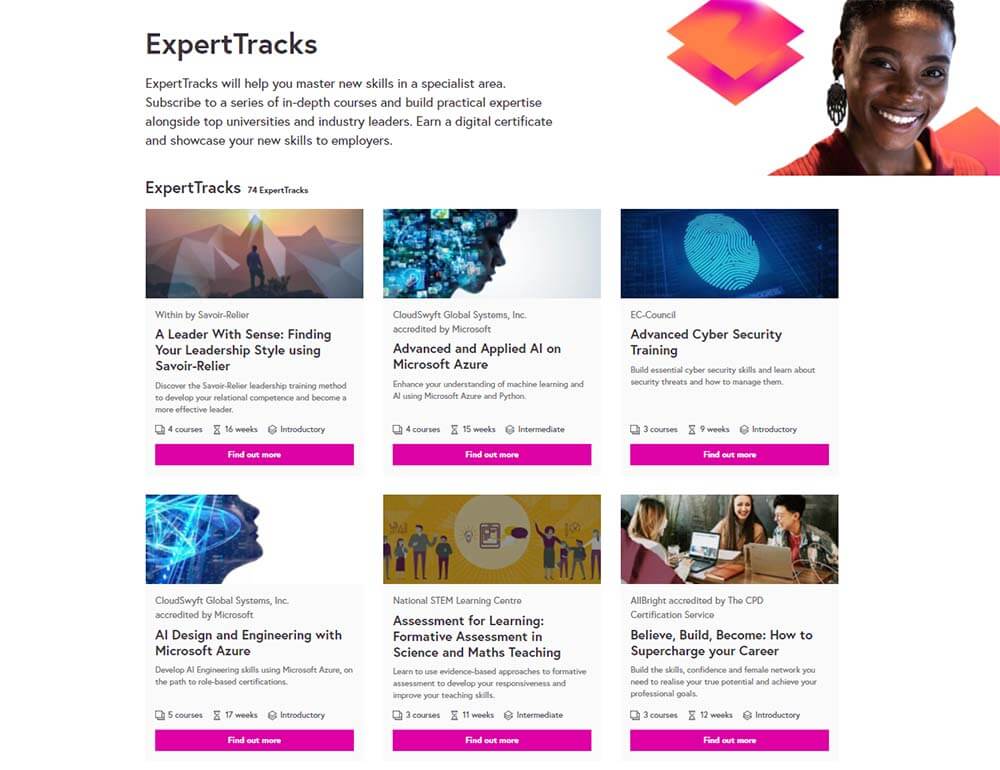
ExpertTracks are the newest form of online learning content offered on FutureLearn. A single ExpertTrack consists of 3-5 individual courses on a related topic and costs £36 ($39) per month. You can choose ExpertTracks both by their topic and by their difficulty (introductory, intermediate, or advanced difficulty).
ExpertTrack programs are a good investment for various reasons:
- Grow your skillset and boost your CV with an ExpertTrack online certificate.
- Gain deeper-level knowledge on any subject you’re most passionate about.
- Start from beginner-level courses and work your way up to advanced-level courses without paying for dozens of individual courses.
- Free 7-day trial period available that allows you to test ExpertTrack content without any monetary risk.
ExpertTracks are a great resource for people who want to get ahead in their careers. For one, having a certificate for a series of courses rather than a single course demonstrates a higher level of expertise. And, the cost savings make the deal even better.
These are a few examples of popular ExpertTracks currently available on FutureLearn:
- “Understanding IELTS” by the British Council
- “Introduction to Psychology” by the Monash University
- “Data Analysis with Excel for Complete Beginners” created by CloudSwyft and accredited by Microsoft
FutureLearn Online Degrees
FutureLearn’s online degree selection is one of the very best across all MOOC sites I’ve seen. Without a doubt, online degrees are one of their greatest strengths. So, if degrees are what you are looking for you should strongly consider going with FutureLearn as your online education platform of choice.
As of right now, they have a total of 34 online degrees available. This is highly impressive when compared to other MOOC giants. Coursera, for example, only has 16 online degree options available. That’s only half of what FutureLearn has. EdX, the third largest platform when it comes to online degree selection, only has 11.
On the other hand, FutureLearn’s selection of universities is fairly limited. They offer a large catalog of online degrees, but not from all that many different universities.
Selection of universities
FutureLearn offers online degrees from a total of 7 universities, with all of them being either in the United Kingdom or Australia. The majority of online degrees are offered by just 3 universities. These three universities are Coventry University (UK), Deakin University (AU) and The Open University (UK). These three universities combined offer 29 of FutureLearn’s total of 34 online degrees. While these are very respectable universities, more variety would have been nice to see.
If you’re not interested in any of the 7 universities offered on FutureLearn, then you might want to look at alternative online degree websites such as Coursera or edX who mainly offer degrees from universities in the United States.

Selection of online degrees
While the selection of universities is only 7, the selection of online degrees is a whopping 34. When compared to other e-learning websites, that’s quite a jaw-dropping choice.
FutureLearn currently offers the following types of online degrees:
- 3 Online bachelor’s degrees
- 14 Online postgraduate degrees
- 17 Online master’s degrees
I am glad to see that unlike some other MOOC sites, FutureLearn decided not to focus solely on online master’s degrees. While their selection of online master’s degrees is still far superior, they have quite a few choices for online bachelor’s degrees and graduate degrees as well.
Online bachelor's degrees
FutureLearn’s selection of bachelor’s degrees is fairly limited. However, with a total of 3 options available it’s still the best selection out of all MOOC platforms. The second-best selection of online bachelor’s degrees is available on Coursera, with its total of 2 online bachelor’s programs.
These are the online bachelor’s degrees available on FutureLearn:
- “International Business” by Coventry University
- “Arts” by The University of Newcastle
- “Quantity Surveying and Commercial Management” by Coventry University
Online postgraduate degrees
FutureLearn offers 14 postgraduate degrees on its platform, making it the best website to obtain an online postgraduate certificate. If you’re unfamiliar with the concept of a postgraduate degree, then think of it as a stepping block in-between a bachelor’s and a master’s degree. It builds on bachelor’s level knowledge, but without the comprehensiveness of a full-sized master’s degree. They typically take 6 to 9 months to complete. If you’d like to know more, the Government of Alberta has created a helpful guide to the United Kingdom’s educational system.
These are the online postgraduate degrees currently available on FutureLearn:
- “Diabetes Education” by Deakin University
- “Digital Learning Leadership” by Deakin University
- “Entrepreneurship” by Deakin University & Coventry University
- “Health Administration, Policy and Leadership” by Murdoch University
- “Hospital Administration” by Deakin University
- “Information Technology Leadership” by Deakin University
- “Leadership” by Deakin University
- “One Health” by Murdoch University
- “Finance” by The Open University
- “Global Development Management” by The Open University
- “Human Resource Management” by The Open University
- “Online and Distance Education” by The Open University
- “Education” by Coventry University
- “Sustainable Development and Humanitarian Action” by Deakin University
Online master's degrees
FutureLearn’s selection of master’s degrees is excellent, with a total of 17 online master’s degrees up for grabs on the platform. As mentioned before, they are offered by universities from the United Kingdom and Australia and take anywhere between 2 to 5 years to complete, depending on study intensity.
These are the online master’s offered on FutureLearn:
- “Management” by Coventry University
- “MBA (Sustainable Tourism)” by Coventry University
- “Business Administration” by Coventry University
- “Cyber Security Management (MBA)” by Coventry University
- “Healthcare (MBA)” by Coventry University
- “Artificial Intelligence (MBA)” by Coventry University
- “Marketing (MBA)” by Coventry University
- “Business and Organisational Psychology (MSc)” by Coventry University
- “Construction Management with BIM (MSc)” by Coventry University
- “Construction Project and Cost Management (MSc)” by Coventry University
- “Cyber Security (MSc)” by Coventry University
- “Disaster Management and Resilience (MSc)” by Coventry University
- “Emergency Management and Resilience (MSc)” by Coventry University
- “End of Life Studies (MSc)” by The University of Glasgow
- “Global Logistics (MSc)” by Coventry University
- “Nursing (MSc)” by Coventry University
- “Project Management (MSc)” by Anglia Ruskin University
What I Liked: FutureLearn Pros
There are many things I liked about studying at FutureLearn. In my opinion, these are the biggest advantages of the platform:
- Sense of Community
- Highly active discussion boards
- Excellent selection of online degrees
- Free certification courses
- Excellent user interface & navigation
- Well-built syllabuses
Sense of community
FutureLearn’s CEO Simon Nelson himself has often highlighted the fact that FutureLearn puts great emphasis on creating a sense of community amongst students. Student-to-student interactions are encouraged across all FutureLearn courses, and this was also evident while I was reviewing their online courses. I have never seen this type of interaction among online course students and it left quite an impression on me.
I have brought out social isolation as one of the primary disadvantages of e-learning in the past, and I applaud any effort to combat loneliness in e-learning. FutureLearn has certainly nailed the proposed solution to this problem, by promoting communication between online students. This method of combating isolation in online students might be how they managed to increase student retention rates to an astonishing 22%.
Highly active discussion boards
This advantage of FutureLearn is closely related to the previous. Virtually every single assignment on FutureLearn courses makes use of peer-to-peer knowledge sharing. In the mindfulness course I was taking, people from all kinds of backgrounds were sharing their skills and experience. Retired doctors, stay-at-home moms, and teenagers were all participating in discussion boards. It felt like everyone was trying to learn from one another, and the discussions that arose sometimes overshadowed even the course content itself.
Excellent selection of online degrees
As mentioned before, FutureLearn currently has the world’s best selection of online degrees. At least when you compare the sheer numbers. While most of the degrees offered on FutureLearn come from the same three UK & Australian universities, the large amount of online degree options available to students is still highly impressive and a massive advantage of the platform.
Free certification courses
FutureLearn offers high-quality accredited certification courses to students for free. While the selection of these free courses is relatively small (28 as of the writing of this FutureLearn review), it’s still a fantastic opportunity for anyone who can’t afford to pay for an online course certificate.
Excellent user interface & navigation
Another element of FutureLearn that I thoroughly enjoyed was the overall user experience. Thanks to the easy navigability, you can come back to a course very easily after a hiatus. This means that you can get back on track very easily even if you have missed some lectures and are behind schedule.
Also, the course catalog is easy to browse through, and the introductory pages for courses showcase all of the information you might need. By that, I mean the topics covered in the course, the starting dates, prerequisites, instructors, price, and so on. On FutureLearn, all the information you need is always easily accessible.
Well-built syllabuses
Syllabuses? Syllabi? I’m not exactly sure, but what I do know is that the courses on FutureLearn are designed to be easy to follow. Every course syllabus on the platform is split into small pages full of concise information and there are no user-unfriendly massive blocks of text. An easy to follow syllabus can make or break a learning experience for me, and I find small chunks of information much more motivating. Throughout all the courses I have taken, I have found that small steps are always easier to follow through with than large ones. Having the ability to follow these course steps through a phone app would be even better, though.
What I Didn’t Like: FutureLearn Cons
Despite the many advantages of FutureLearn I listed previously, I also believe that the platform has some room for improvement. Here are some of the disadvantages of the platform that I noticed during my review:
- No Android or iOS apps
- Course catalog could be larger
No Android or iOS apps
This is a rather obvious disadvantage to bring out, but an important one. When I take online courses, usually at least half of my learning (sometimes more) takes place outside home. For example, I like to listen to online classes while commuting, walking my dog, running or going to the gym. An app built specifically for a smartphone works much more effectively in this regard than simply using the website. For example, I was annoyed by the fact that I could not turn the display off my phone while listening to lectures. Turning the display off resulted in the lecture stopping and it forced me to waste a considerable amount of battery when taking FutureLearn’s classes.
In the future, I’m hoping that FutureLearn will create a dedicated app for smartphones. This would enable learners like me to have more freedom in how we decide to pursue their online classes.
Course catalog could be larger
While FutureLearn’s course catalog has gone through some significant improvements over the last few years, there is still some room for improvement. The currently available 430 or so courses are no match to Coursera’s 4000, or edX’s nearly 3000. I would be interested to see more FutureLearn courses in design and programming subjects. Hopefully, with time their course catalog will include a larger variety of courses.
Review Conclusion: Is FutureLearn Legit?
FutureLearn is a fully legitimate and high-quality online education website. It’s one of the first major e-learning websites to arise from Europe, and it brought numerous UK & Australian universities to relevancy on the global scale. It’s by far my favorite non-U.S. MOOC site.
When it comes to my experiences with studying on FutureLearn, I have very positive feelings overall. Most of all, I was very impressed by the peer-to-peer interaction, student forums and discussion boards on FutureLearn. No other MOOC site I’ve used has utilized student discussions as effectively as FutureLearn. Also, the inclusion of free certification courses is a very welcome bonus for low-income students, and the fantastic selection of online degrees is nothing to sneeze at.
The only aspects which I believe FutureLearn could improve upon are its relatively small catalog of online courses and their lack of a smartphone app. Once they take care of these two elements, I will confidently rank it as one of the most outstanding MOOC sites.
All in all, during my review of FutureLearn I was very satisfied with their service. I’ll be looking forward to trying out more of their online courses as time goes on, and I might even end up subscribing to FutureLearn Unlimited at some point in this year.
